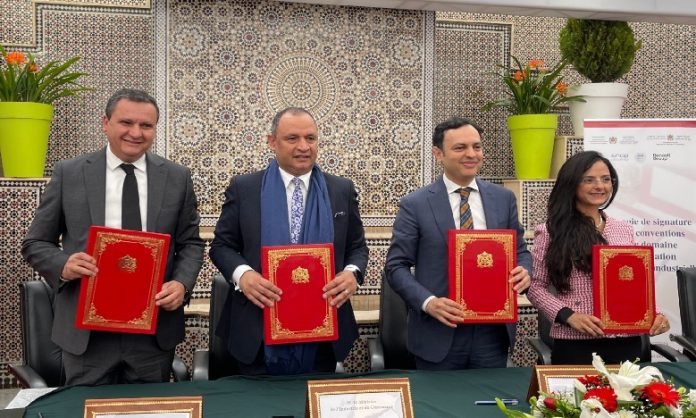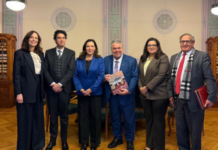Two agreements to reinforce training in the automotive industry have been signed, Thursday in Rabat, between the Ministry of Economic Inclusion, Small Business, Employment and Skills, the Ministry of Industry and Trade, the Office of Vocational Training and Employment Promotion (OFPPT), the Renault Group Morocco and the company SNOP-Group FSD Morocco.
Initialled by the Minister of Economic Inclusion, Small Business, Employment and Skills Younes Sekkouri, the Minister of Industry and Trade Ryad Mezzour, the OFPPT Director General Loubna Tricha, the Director General of the Renault Group Morocco Mohamed Bachiri, and the General Manager of SNOP-Groupe FSD Maroc Tajeddine Bennis, the two agreements aim to support the evolution and development of the automotive industry through preparing qualified human resources in line with the manufacturers’ skill needs.
This Public-Private Partnership (PPP) is part of the roadmap to develop vocational training presented in 2019 before HM King Mohammed VI and meets the recommendations of the New Development Model (NMD) which places the training of human capital among the imperatives of economic growth in Morocco.
Speaking on this occasion, Sekkouri highlighted the importance of vocational training in supporting sectoral strategies, through developing human capital and improving business performance, stressing the role played by the OFPPT, the main training operator, as a locomotive for the preparation and mobilization of skills for its ecosystem, both nationally and internationally.
He also recalled the projects already initiated, under the PPP, for strengthening skills in the automotive sector, highlighting the contribution of cooperation between the OFPPT, the Renault Group and the company SNOP in this regard.
For his part, Mezzour said that developing national industry and maintaining its competitiveness remain dependent on a qualified, dynamic and scalable human capital, noting that the agreements signed today will allow the development of new skills and integration of young people in the national productive fabric.
In turn, Tricha said that the agreements signed reflect the shared desire of the various stakeholders to support the development of the automotive sector, as well as the common belief that the issue of skills development is that of all, public authorities, industry and training operators.
“The first partnership sealed with the Renault Morocco Group concerns the implementation of a training offer that meets the group’s specific needs, among others industry 4.0, the electric car and the automotive culture in general,” she said, noting that the axes of collaboration include the development of a dedicated training engineering, the consultation on the choice of educational equipment and the development of trainers who will benefit from seminars and visits to Renault plants.
Regarding the second agreement signed with the company SNOP-Group FSD Morocco, Tricha said it concerns industrial maintenance, with the establishment of three training courses in the fields of robotics, automation, and hydraulics, indicating that the training will start in 2023 in Tangier, with the prospect of expanding it to the regions of Rabat and Casablanca from 2024.





